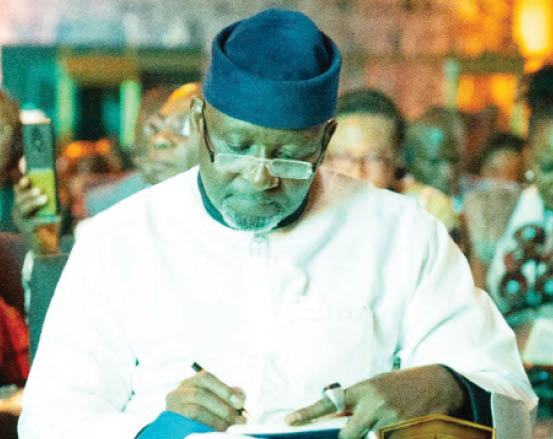Before Abuja-Kaduna train service resumes
At a recent media briefing to give a scorecard of his ministry in Abuja, Transportation Minister Muazu Sambo revealed that the suspended train services between Abuja and Kaduna will resume this month. The Nigeria Railway Corporation (NRC), which runs the service, suspended the operation following an attack by suspected bandits on a moving train along […]

Mr. Muazu Jaji Sambo
At a recent media briefing to give a scorecard of his ministry in Abuja, Transportation Minister Muazu Sambo revealed that the suspended train services between Abuja and Kaduna will resume this month.
The Nigeria Railway Corporation (NRC), which runs the service, suspended the operation following an attack by suspected bandits on a moving train along the route on March 28, 2022, killing and kidnapping several passengers.
- NIGERIA DAILY: Untold story of trader who lost Over N100 Million goods to Kano Market Fire
- Nigeria won’t sink under my watch – Tinubu
Following the incident, the federal government suspended the train operation on that route in commiseration with families of those who lost their lives as well as those injured and kidnapped, and also to take stock of matters arising.
A couple months ago, in September, while speaking to journalists on progress made on the repair work on the damaged rail track, the Managing Director of NRC, Fred Okhiria, stated that the damaged rolling stock and the track had been restored, indicating that train services on that route could be resumed. But the MD stated further that resumption of the services could only come when all passengers kidnapped during the unfortunate incident have been released by their abductors.
Going forward, in anticipation of resumption of services, the MD said, “Government had set up a committee to ensure maximum security for the train passengers once the operation eventually resumes.”
With the recent release of the last batch of hostages, and the measures taken to ensure security of commuters, the trains and the operational infrastructure, government now seems ready to resume operations as indicated by the transportation minister.
Daily Trust commends the government for securing the release of the victims and for working towards resuming the train services. Nigerians will no doubt welcome this development, as the Abuja-Kaduna train operation is seen in many ways as a convenient and secure means of transportation between the two major cities. As a result, the services grew exponentially from once a day between the two cities when it was first introduced to four times daily both ways. Also, to cope with increased demand, bigger coaches were added.
The growth in the operations no doubt had to do with the incidence of insecurity on the Abuja-Kaduna highway, with many opting to use the railway in order to avoid either being kidnapped or killed by bandits who made the full stretch of the highway a base for their nefarious activities.
Against the background of the bombing incident of March 28, many Nigerians will, however, welcome the resumption of the train operations cautiously and with some justification. This is especially so as the operation of the service before the unfortunate bombing incident left a lot to be desired.
In this regard, we have had cause to draw the attention of the authorities to observable lapses like the ticket racketeering going on at the stations, the inadequate security services at both the stations and on the route of the train. These led to several cases of impersonation, late train departures and arrivals, among others.
Although the authorities were compelled to act following complaints by commuters, even with the introduction of measures like online ticketing and security checks on passengers, the sharp practises continued unabated. A pointer to this was the difficulty in properly identifying the passengers who lost their lives and those who were taken hostage by the attackers of the train on March 28 this year.
The technical services too, were a sore point to note. On more than one occasion, the trains broke down en route at very inconvenient hours, in the middle of nowhere, needlessly exposing the passengers to danger.
We would like to believe that government has used the opportunity of the suspension of the Abuja-Kaduna train services to undertake a full review of the several issues that led to the March 28 bombing incident. This should include proper ticketing procedures for identification and documentation of authentic passengers, non-tolerance of touts and other undesirables in and around the train stations, and the prompt servicing of equipment and replacement of infrastructure like locomotives, rolling stock and tracks.
Corrupt staff should also be identified and weeded out because their activities lead to poor and inefficient train operations, in addition to the security implications.
Surveillance should not just be limited to stations. In addition to the technical aspect of security and surveillance operation planned for the route, there should be the human element of concretely engaging the inhabitants of communities along the train route in securing the right of way. That way, they can take part in the ownership of the train services that runs through their communities. We must hasten to add too that these measures should not just be limited to the Abuja-Kaduna route. They should be extended to the Lagos-Ibadan and Itakpe-Warri routes as well and should serve as the template for other rail routes now under consideration.
We note that, in view of the yuletide as well as the election seasons that are now upon us, the resumption of the Abuja-Kaduna rail services will greatly ease transportation along that route and beyond. But government, while contemplating this commendable step, should ensure that all necessary measures are taken to make the services as convenient and secure as possible for the commuting public.
